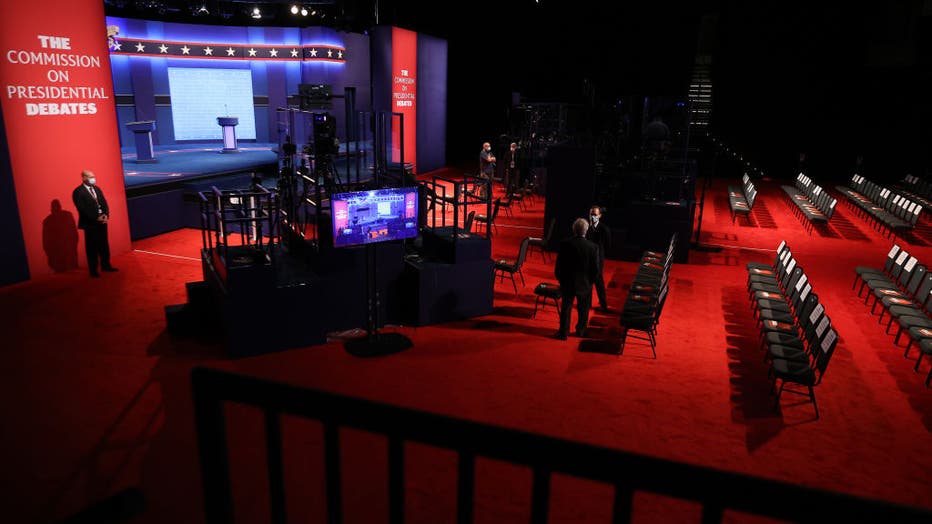High stakes for Trump, Biden heading into final debate
NASHVILLE, Tenn. - President Donald Trump and Democratic challenger Joe Biden hurtled toward Thursday night's final debate, which could be the trailing incumbent's best chance to change the race's trajectory with just 12 days left until the election.
The Nashville debate offered their final national stage to outline starkly different visions for a country in the grips of a surging pandemic that has killed more than 225,000 Americans and cost millions of jobs. Despite historic tumult, the race has remained largely unchanged with Biden holding advantages in many battleground states while Trump faces a shortage of campaign cash and, crucially, time.
Worried that Trump could lose the White House and cost Republicans the Senate, some advisers urged him to trade his aggressive demeanor from the first debate for a lower-key style and put the spotlight on Biden, whom he derides as “Sleepy Joe.” But Trump made no such promise.
Biden, who has stepped off the campaign trail for several days in favor of debate prep, expects Trump to get intensely personal. The former vice president and his inner circle see the president’s approach chiefly as an effort to distract from the coronavirus, its economic fallout and other crises of Trump's term.

The arena is set for the second presidential debate in the Curb Event Center on the campus of Belmont University October 22, 2020 in Nashville, Tennessee. (Photo by Chip Somodevilla/Getty Images)
“Hopefully he’ll play by the rules," Biden said as he boarded his plane for Tennessee. “I’m looking forward to this.”
Final debates often play an outsized role in electoral outcomes. But Thursday night's showdown will be different from those past.
More than 46 million people have already cast their ballots as part of a pandemic-era rise in early voting. In an election dominated by a polarizing president, far fewer undecided voters remain than at this point in 2016.
In a visual reminder of the pandemic that has rewritten the norms of American society and fundamentally changed the campaign, sheets of plexiglass had been installed onstage Wednesday between the two men. But in the hours before the debate, they were removed.
The debate, moderated by NBC’s Kristen Welker, is a final chance for each man to make his case to a television audience of tens of millions of voters. And questions swirled as to how Trump, whose hectoring performance at the first debate was viewed by aides as a mistake that turned off viewers, would perform amid a stretch of the campaign in which he has taken angry aim at the news media and unleashed deeply personal attacks on Biden and his adult son.
In an effort to curtail interruptions this time, the Commission on Presidential Debates announced that Trump and Biden would each have his microphone cut off while his rival delivered an opening two-minute answer to each of six debate topics.
The mute button won’t figure in the open discussion portion of the debate.
When he feels cornered, Trump has often lashed out, going as negative as possible. In one stunning moment during the 2016 campaign, in an effort to deflect from the release of the Access Hollywood tape in which he is heard boasting about groping women, Trump held a press conference just before a debate with Hillary Clinton during which he appeared with women who had accused Bill Clinton of sexual assault. He then invited them to watch as audience members.
In a similar move, Trump's campaign held another surprise pre-debate news conference, this time featuring Tony Bobulinski, a man who said he was Hunter Biden's former business partner and made unproven allegations that the vice president's son consulted with his father on China-related business dealings.
Trump — who has urged Attorney General William Barr to investigate the Bidens — has been promoting an unconfirmed New York Post report from last week that cites an email in which an official from the Ukrainian gas company Burisma apparently thanks Hunter Biden, who served on the company’s board, for arranging for him to meet Joe Biden during a 2015 visit to Washington. The Biden campaign has rejected Trump’s assertion of wrongdoing and notes that Biden’s schedule did not show a meeting with the Burisma official.
As for the pandemic, Biden and Trump were both tested for COVID-19 on Thursday and the results came back negative.
Trump announced just two days after the first debate that he had tested positive for the virus. He spent three nights in Walter Reed National Military Medical Center before returning to the White House.
The initial debate's belligerent tone was somehow fitting for what has been an extraordinarily ugly campaign. Amid heated clashes over the pandemic, the Supreme Court and the integrity of the election itself, Trump refused to condemn white supremacists who have supported him, telling one such group known as the Proud Boys to “stand back and stand by.”
After Trump's COVID diagnosis, the debate commission ruled that the second debate, which was to have been held last week, be virtual. Trump balked, and the two men holding dueling town halls instead, speaking at the same time more than 1,000 miles (1,600 kilometers) apart.
Biden could also expect questions about his comments in a CBS interview, released Thursday, in which he wouldn’t rule out trying to add justices to the Supreme Court. The issue has followed him since the Sept. 18 death of Supreme Court Justice Ruth Bader Ginsburg and the GOP-controlled Senate’s rush to confirm Trump’s nominee to succeed her, Judge Amy Coney Barrett.
___
Lemire reported from Washington, Price from Las Vegas. Additional reporting from Steve Peoples in Nashville, Bill Barrow in Atlanta, Alexandra Jaffe, Stephen Braun and Zeke Miller in Washington and Aamer Madhani in Chicago.

